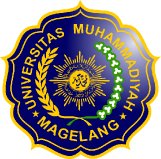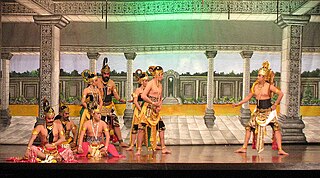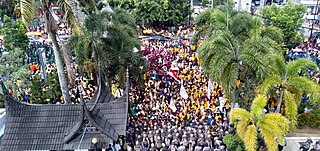Discovery Channel, known as The Discovery Channel from 1985 to 1995, and often referred to as simply Discovery, is an American cable channel owned by Warner Bros. Discovery, a publicly traded company run by CEO David Zaslav. As of June 2012, Discovery Channel was the third most widely distributed subscription channel in the United States, behind now-sibling channel TBS and The Weather Channel; it is available in 409 million households worldwide, through its U.S. flagship channel and its various owned or licensed television channels internationally.

East Java is a province of Indonesia located in the easternmost third of Java island. It has a land border only with the province of Central Java to the west; the Java Sea and the Indian Ocean border its northern and southern coasts, respectively, while the narrow Bali Strait to the east separates Java from Bali by around 2.29 kilometres (1.42 mi). Located in eastern Java, the province also includes the island of Madura, as well as the Kangean islands and other smaller island groups located further east and the Masalembu archipelago to the north. Its capital is Surabaya, the second largest city in Indonesia, a major industrial center and also a major business center. Banyuwangi is the largest regency in East Java and the largest on the island of Java.

The angklung is a musical instrument from the Sundanese in Indonesia that is made of a varying number of bamboo tubes attached to a bamboo frame. The tubes are carved to produce a resonant pitch when struck and are tuned to octaves, similar to Western handbells. The base of the frame is held in one hand, while the other hand shakes the instrument, causing a repeating note to sound. Each performer in an angklung ensemble is typically responsible for just one pitch, sounding their individual angklung at the appropriate times to produce complete melodies.

Pendet dance is one of indonesia's culture. It is a traditional dance from Bali, Indonesia, in which floral offerings are made to purify the temple or theater as a prelude to ceremonies or other dances. Pendet is typically performed by young girls, carrying bowls of flower petals, handfuls of which are cast into the air at various times in the dance. Pendet can be thought of as a dance of greeting, to welcome the audience and invite spirits to enjoy a performance. It is one of the oldest Balinese dances, although the current form was codified in the 1950s.

Muhammadiyah ; officially Muhammadiyah Society is a major Islamic non-governmental organization in Indonesia. The organization was founded in 1912 by Ahmad Dahlan in the city of Yogyakarta as a reformist socioreligious movement, advocating ijtihad - individual interpretation of Qur'an and Sunnah, as opposed to Taqlid - conformity to the traditional interpretations propounded by the ulama. Since its establishment, Muhammadiyah has adopted a reformist platform mixing religious and secular education, primarily as a way to promote the upward mobility of Muslims toward a 'modern' community and to purify Indonesian Islam of local syncretic practices. It continues to support local culture and promote religious tolerance in Indonesia, while a few of its higher education institutions are attended mostly by non-Muslims, especially in East Nusa Tenggara and Papua provinces. The group also runs a large chain of charity hospitals, and operated 128 universities as of the late 1990s.

Ponorogo Regency is an inland regency of East Java Province of Indonesia. It is considered the birthplace of Reog Ponorogo, a traditional Indonesian dance form. The regency covers an area of 1,371.78 km2 (529.65 sq mi), and it had a population of 855,281 at the 2010 census and 949,318 at the 2020 census; the official estimate as of mid-2023 was 959,500. The capital of the kabupaten is the local town of Ponorogo located around 30 km (19 mi) south of the main East Java city of Madiun and 65 km (40 mi) south of the town of Ngawi.

Reog or Réyog is a traditional Indonesian dance in an open arena that serves as folk entertainment and contains some magical elements. The main dancer is a lion-headed person with a peacock feather decoration, accompanied by several masked dancers and Kuda Lumping. Reog is one of the performing arts from the northwestern region of East Java and Ponorogo is the region where Reog originated. The city gate of Ponorogo is decorated with warok and gemblak, two characters who were present at the time when Reog is performed. Reog is one of Indonesia culture that is still very strong with mystical elements and mysticism.

Kuda Lumping is a traditional Javanese dance originated from Ponorogo, East Java, Indonesia depicting a group of horsemen. Dancers "ride" horses made from woven bamboo and decorated with colorful paints and cloth. Generally, the dance portrays troops riding horses, but another type of Kuda Lumping performance also incorporates trances and magic tricks. When the "possessed" dancer is performing the dance in trance conditions, he can display unusual abilities, such as eating glass and resistance to the effects of whipping or hot coals.

Muhammadiyah University of Magelang is a private university that belongs to Muhammadiyah organization. The university was founded in Magelang, Central Java, Indonesia on August 31, 1964.

Indonesia and Malaysia established diplomatic relations in 1957. It is one of the most important bilateral relationships in Southeast Asia.

Sundanese dances is a dance tradition that is a part of ritual, artistic expression as well as entertainment and social conduct among the Sundanese people of West Java and Banten, Indonesia. Sundanese dance is usually cheerful, dynamic and expressive, with flowing movements in-sync with the beat of kendang accompanied with Gamelan degung music ensemble.
Muhammadiyah University of Yogyakarta is a private university in Yogyakarta under affiliation of Muhammadiyah, the second largest Islamic organization in Indonesia.
Jamaah Ansharut Daulah is an Indonesian terrorist group that has been reported to be linked to the 2018 Surabaya bombings as well as the 2019 Jolo Cathedral bombings. The Islamic State of Iraq and the Levant (ISIL) has been reported as claiming responsibility for both attacks. The group had been identified by the United States Department of State as a terrorist organization in 2017. It is banned by Iraq and Indonesia. It is also listed as a terrorist organization by the United Nations Security Council on 4 March 2020.

A series of mass protests led by students took place at major cities in Indonesia from 23 September 2019, to rally against new legislation that reduces the authority of the Corruption Eradication Commission (KPK), as well as several bills including a new criminal code that penalises extramarital sex and defamation against the president. The protesters consisted of mostly students from over 300 universities, with no association with any particular political parties or groups. The protests were the most prominent student movement in Indonesia since the 1998 riots that brought down the Suharto regime.

Barong dance is a style of traditional Balinese from Bali, Indonesia. The dance demonstrates about the mythological depiction of animals that have supernatural powers and the ability to protect humans. Barong is the king of the spirits, leader of the hosts of good, and the enemy of Rangda, the demon queen and mother of all spirit guarders in the mythological traditions of Bali. The Barong dance featured a battle between Barong and Rangda to represent the eternal battle between good and evil.

Indonesian theatre is a type of art in the form of drama performances that are staged on a stage, with a distinct Indonesian nuance or background. In general, theatre is an art that emphasizes the performing arts that are displayed in front of a large crowd. In other words, theater is a form of visualisation of a drama that is staged on the stage and watched by the audience. Indonesian theatre includes the performing arts of traditional theater and modern theatre located in the territory of Indonesia. Some examples of Indonesian theater are Arja, Wayang, Wayang wong, Lenong, Ludruk, Janger, Randai and others. Theatre in Indonesia can also be referred to as regional or ethnic theatre, because it originates and develops from 1,300 ethnic cultures in Indonesia.

The 2022 Indonesian student protests, also known as the 11 April demonstrations, were a series of protests led mostly by students throughout Indonesia. They were triggered by rumours regarding a delay of the 2024 election and proposals of amending the Constitution to allow President Joko Widodo to have a third term. They drew attention to food prices and the rising price of cooking oil in Indonesia. They were conducted mostly by university and college students in major cities across the country, and much of the organizing was done by the All-Indonesia Students Executive Alliance (BEM-SI).














